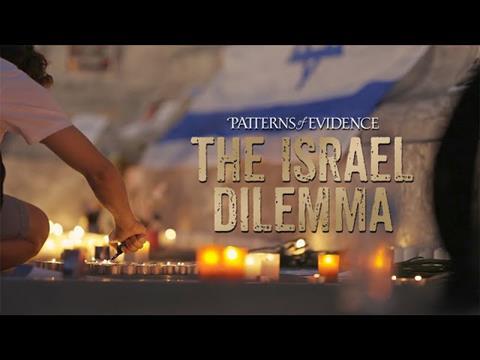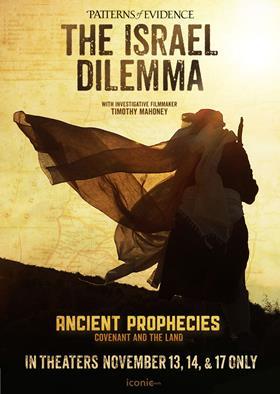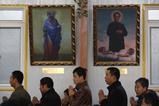God made an everlasting covenant with Israel and their turbulent history from King David to today, is all prophesied in the Old Testament. That’s according to this new Christian-made documentary The Israel Dilemma. Chris Goswami went to see it

“You don’t lose the right to your home because somebody kicked you out.”
So says Israel’s Prime Minister, Benjamin Netanyahu, interviewed in this new investigative film that links Old Testament prophecy with Israel’s modern-day claim for its homeland. In fact, says Netanyahu, the Bible, “is Israel’s title to the land”.
Israel, it seems, has always been engulfed in a cycle of war, interspersed with peace agreements only to end in another war - and it’s all about the land.
This film’s bold claim is that God made an everlasting covenant with Israel and that their turbulent past, going back to King David in 1000 BC, right up to their embattled present, is all prophesied in the Old Testament. It uses high-quality on-location scenes and captivating newsreel, including footage from the founding of the Jewish state of Israel in 1948.
Christian film-maker Timothy Mahoney’s approach is to start by explaining a biblical text that prophesies an event. He then introduces historic records from outside the Bible to prove the event happened. Finally, he incorporates recent archaeological finds from ancient civilisations such as Assyria, Babylon, and Israel to further confirm the prophecy.
This three-pronged approach that weaves together Bible prophecy, non-biblical literature and archaeology, combined with scholarly commentators, often works well. Let’s take an example.
At the end of 2 Kings Israel is taken off into exile by Nebuchadnezzar and the Babylonians until, approximately 70 years later, the Persian ruler Cyrus decrees that the Jews may return to their homeland and rebuild the city walls of Jerusalem (as recorded in Nehemiah and Ezra).
Mahoney quotes Isaiah (chapters 41-45) where Isaiah prophecies that Cyrus “the anointed one”, will be chosen by God to return the Jews back to Israel, and he points out that the words of Isaiah predate Cyrus by over 100 years. This is the Bible prophecy.
He then introduces a historic find called the “Cyrus Cylinder”, a literary artefact discovered in Babylon (modern day Iraq) containing ancient texts that support the notion that the Jews were in exile and were indeed given permission by Cyrus to return home. This is the non-biblical evidence.
Finally, the film moves to the excavated evidence of the walls of Jerusalem being rebuilt as the archaeological evidence.
This three-way comprehensive approach is repeated for several Old Testament prophecies. In fact, through the film, Mahoney deals with five different types, or layers, of prophecy relating to: the kingdom of Israel, destruction of the kingdom, scattering of the Jews, persecution of the Jews and the return to the promised land.
Chosen-ness
This theme of Israel being God’s chosen nation runs throughout the film. There is much (possibly too much) imagery of a bride (Israel) belonging to her bridegroom (God). Israel and God make a covenant, a binding vow to be faithful to one another. Israel’s repeated infidelity, however, means the promises of the covenant are withdrawn - and there begins Israel’s slide through these five different layers of prophecy.
The film also makes clear, that being chosen is not only a privilege, but can be burdensome. A great deal is expected from Israel in return for being God’s chosen light to the nations. This uneasy balance of privilege and responsibility is nicely summarised by a clip from Fiddler on The Roof, itself a film steeped in Jewish culture: “I know we’re chosen. But once in while can’t you choose someone else?”
Where are the sceptics?
As with many films that take a strong position on a highly polarising topic, we need to hear from the sceptics. In this film, they are largely absent.
So, for example, the Cyrus Cylinder does support Mahoney’s argument, but it does not actually mention the Jews by name. This isn’t mentioned.
Secondly, scholars contest the dating of Isaiah’s prophecy - many believe that Isaiah was written after the events involving Cyrus. This point is reflected in the film, but the only argument made for the earlier dating of Isaiah - that the literary style of Isaiah fits the earlier date - will not convince everyone.
The film also mentions, on multiple occasions, that Moses authored the first five books of the Old Testament. In an investigative film, you need evidence to defend statements like this.

This is a pity since, if these sceptical voices were better represented, and then countered, the film would be altogether stronger.
However, the most serious criticism is that Palestinian perspectives are barely mentioned. Addressing their historical claim and struggle would have added depth. This exclusion will be unpalatable for many.
Amidst the current upheaval in the Middle East, The Israel Dilemma offers an engaging, if somewhat one-sided, argument tying biblical prophecy to Israel’s claim to its land. It’s a valuable resource for Christians wanting to connect scripture with modern-day events, but its lack of opposing views will alienate some.
Patterns of Evidence: The Israel Dilemma is available on digital and DVD now





































1 Reader's comment